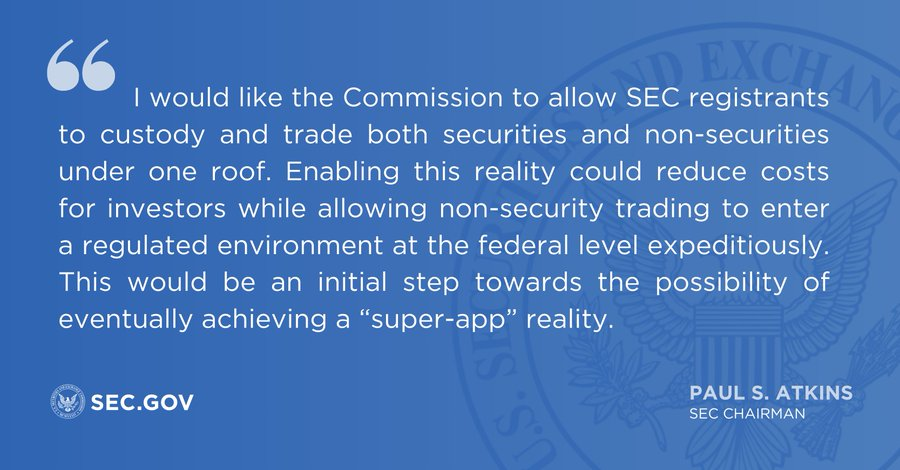Analysis of the Importance of SEC-Registered Institutions Custody and Trading Securities and Non-Securities Assets on the Same Platform
Many may not have noticed this important statement by the new SEC Chairman Paul S. Atkins. If implemented, it could open another window for cryptocurrencies and RWA, and elevate the ceiling for compliant exchanges.
First, let's look at Paul S. Atkins' original statement (translated): "I hope the Commission allows SEC-registered institutions to custody and trade securities and non-securities assets on the same platform. Achieving this goal can lower investor costs while allowing non-securities trading to enter the federal regulatory environment more quickly. This will be a preliminary step towards realizing the possibility of a 'super-app.'"
So why do I say this statement is very important?
Paul S. Atkins expressed a desire for the SEC to allow registered institutions to custody and trade securities and non-securities assets (such as cryptocurrencies, stablecoins, NFTs, etc.) on the same platform. If this policy is implemented, it will significantly promote regulatory integration and accelerate the compliance process for crypto assets.
In the past, there was a clear separation between traditional finance (TradFi) and crypto finance (DeFi or CeFi), with a fragmented regulatory framework. Paul S. Atkins' proposal suggests that crypto assets may be formally integrated into the U.S. financial system, reducing their 'marginalized' status while addressing jurisdictional coordination issues between the SEC and CFTC.
One can imagine being able to purchase cryptocurrencies and U.S. stocks, U.S. Treasury bonds, or even ETFs simultaneously on Coinbase, and directly using USDC (which is equivalent to USD on Coinbase) for purchases.
This approach can lower investors' trading and compliance costs, allowing "non-securities" transactions like crypto assets to quickly fall under federal regulation, paving the way for the future "super-app," which means "one app to connect all financial services."
Additionally, there is an extended concept that allows for the direct purchase of compliant cryptocurrencies like $BTC and $ETH on Nasdaq. Of course, this is different from ETFs, but that is not the focus; we can discuss it further in the future.
This represents:
- Regulatory Integration and Compliance Acceleration
In the past, traditional finance (TradFi) and crypto finance (DeFi or CeFi) were two separate entities with fragmented regulation. This statement indicates the SEC's willingness to unify both under a compliance framework. Crypto assets may no longer be "marginalized" but formally integrated into the U.S. financial system.
- Green Light for Banks/Brokerages to Enter Crypto Business
Currently, most large banks and brokerages in the U.S. cannot engage in cryptocurrency business due to compliance risks. If the SEC's policy shifts to allow these licensed institutions to custody and trade crypto assets, it will bring a significant influx of mainstream capital into the market.
- Integration of Cryptocurrencies with Traditional Assets like U.S. Stocks
The development of "super-apps" on platforms like Coinbase, Fidelity, and Robinhood may accelerate. This will promote the emergence of the "Super-App" model in the U.S., which refers to an integrated composite trading platform where one app can handle payments, trading, investment, and social functions.
This effectively advances the application of RWA in the cryptocurrency space, facilitating the trading of stablecoins with traditional compliant assets. Compliant exchanges can trade $BTC spot and futures while also engaging in transactions involving U.S. stocks, U.S. Treasury bonds, ETFs, etc., achieving a "unified platform for coins and stocks" in the compliance domain.
For RWA, this is a very important opportunity, as it ensures that RWA will not only occur on-chain but can also seamlessly connect traditional finance and crypto finance, enabling a two-way connection between #RWA on exchanges and #RWAFi on-chain.
If this direction receives support from Congress or a majority of SEC commissioners, it could represent the most significant paradigm shift in U.S. financial regulation in 20 years, with profound implications for the crypto industry, brokerages, fintech platforms, and even the global competitiveness of the U.S. dollar.
This tweet is sponsored by @ApeXProtocolCN | Dex With ApeX

免责声明:本文章仅代表作者个人观点,不代表本平台的立场和观点。本文章仅供信息分享,不构成对任何人的任何投资建议。用户与作者之间的任何争议,与本平台无关。如网页中刊载的文章或图片涉及侵权,请提供相关的权利证明和身份证明发送邮件到support@aicoin.com,本平台相关工作人员将会进行核查。



